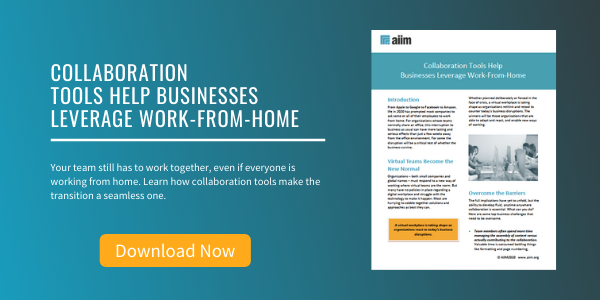
Are we so focused on input that we’ve overlooked the need to output information?
Prior to becoming involved with the content and information management industry, I spent several years in the high-volume printing industry. I was a mid-level executive for a large health insurance provider and was responsible for printing and mailing, pre-press and offset printing, and electronic book publishing across four states. And let me tell you, my teams concentrated on output. Tons of it. Twenty four hours a day, 365 days of the year. Imagine stacks of paper everywhere and truckloads of output being shipped and mailed nationwide.
This is in great contrast to today and my current involvement in the enterprise content management industry (now Intelligent Information Management) where our attention is largely focused on input...with much less focus on output. We aggressively capture data, input that information into advanced systems and databases, and then safeguard it with methodologies and teams designed to collect and protect information.
But the challenge organizations face often times is not just collecting the data; but the ability to output data in highly complex, high-value documents. Depending on the industry and organization, outputted documents like proposals or regulatory submissions can be of critical importance to the enterprise. The trouble is that creating and co-authoring these high volume, big stakes documents can be overwhelming and often painfully disorganized. The resulting chaos is a nightmare to manage; often resulting in late nights and stressful deadlines that ultimately become a burden on the revenue-generating ability of the organization.
Does this sound like a familiar scenario? If so, you may want to download this free tip sheet from AIIM where I explore three best practices to co-authoring using a database-driven approach.
- Analyze your process
- Standardize your content
- Put authors in control
It starts with analyzing your process to understand the gaps in the authoring effort and how the system and process improvements can make a difference. Another best practice is to standardize your content and make it available in an authoring database for the enterprise; a giant step in streamlining the work. And finally by putting authors in control, organizations find that many of the bottlenecks that plague the process can be eliminated.
How can you move forward today and make important changes? First, you need to learn more about these best practices and how you can use them too. And look for partners and suppliers that have the right mix of technology, capability, and vision that will help you not only collect and protect information, but use it in ways that bring value and increased revenue to your organization.
About Kevin Craine
Kevin Craine is a professional writer, an internationally respected technology analyst, and an award-winning podcast producer. He was named the #1 Enterprise Content Management Influencer to follow on Twitter and has listeners and readers worldwide. Kevin creates strategic content for the web, marketing, social media, and more. He is the written voice for some of North America's leading brands and his interviews feature today's best thought leaders. His client list includes many well-known global leaders like IBM, Microsoft and Intel, along with a long list of individuals and start-ups from a wide variety of industries. Kevin's podcasts have been heard around the world, including the award-winning weekly business show "Everyday MBA". He is also the host and producer of "Bizcast" on C-Suite Radio and the producer behind podcasts for Epson, Canon, IBM and AIIM International, among others. Prior to starting Craine Communications Group, Kevin was Director of Document Services for Regence BlueCross BlueShield where he managed high volume document processing operations in Seattle, Portland and Salt Lake City. He also spent time at IKON as an Enterprise Content Management consultant working with national and major accounts. He was the founding editor of Document Strategy magazine. Kevin has also been, at one point or another, an adjunct university professor, a black belt martial artist, and a professional guitarist. Kevin holds an MBA in the Management of Science and Technology as well as a BA in Communications and Marketing.



